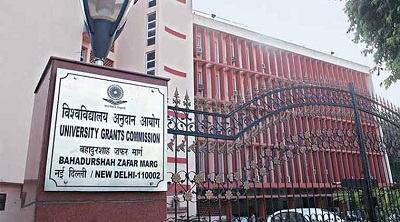
New Delhi. ; The University Grants Commission (UGC) has once again cautioned students against enrolling in unrecognized institutions masquerading as universities. The latest warning targets the Institute of Management and Engineering located in Kotla Mubarakpur, Delhi, for offering unapproved degree programmes.
The Commission clarified that the institute is not established under any Central or State Act, nor recognized under Sections 2(f) or 3 of the UGC Act, 1956, making all degrees it offers academically and professionally invalid.
A Nationwide Problem: 22 Fake Universities Operating Across India
According to official UGC data, 22 unrecognized entities are currently functioning as “universities” across the country.
- Delhi tops the list with nine fake universities, followed by Uttar Pradesh with five.
- Others are spread across Andhra Pradesh, Kerala, West Bengal, Maharashtra, and Puducherry.
Delhi’s dominance in this list is linked to its large student population, anonymity, and thriving broker networks, which make it fertile ground for such operations. These institutes often use credible-sounding names—including words like National, Technology, Management, or Institute—to appear legitimate.
In contrast, institutions in Uttar Pradesh frequently use traditional terms such as Vidyapith, Parishad, or Open University to mimic genuine distance-learning institutions.
Why the Menace Persists
Despite UGC’s repeated crackdowns and published lists of recognized and fake universities, students and parents often skip verification and rely instead on advertisements or agents.
Misleading marketing language like industry-affiliated, internationally validated, or autonomous status adds to the confusion — though none of these terms legally grant the right to award degrees.
UGC’s powers are limited to issuing warnings and advisories. Actual enforcement falls under state governments, and bureaucratic delays often allow these fake institutions to rebrand or relocate before being shut down.
The result: a low-risk, high-profit ecosystem that continues to thrive on misplaced trust and weak regulation.
Checklist: How to Verify a University’s Legitimacy
Before enrolling, students and parents should perform these quick checks:
Check UGC Recognition:
- Verify if the university appears on the official UGC list of recognized institutions under Sections 2(f) or 3.
- https://www.ugc.gov.in
Confirm Professional Approval:
- For technical or professional degrees, cross-check with relevant councils like AICTE, PCI, or NMC.
Beware of Misleading Labels:
- Terms like “industry-linked,” “internationally accredited,” or “autonomous” do not mean degree-awarding power.
Verify Certificates:
- Genuine universities issue degrees that can be verified via DigiLocker or NAD QR codes.
Check UGC’s Fake University List:
- If the name appears there, it’s a red flag — avoid it, no matter how appealing the offer sounds.
The Larger Picture
The issue is not a lack of regulation, but the lack of swift enforcement. Until verification becomes second nature to students and parents, fake universities will continue to exploit trust for profit.
Click Here for More Latest News
